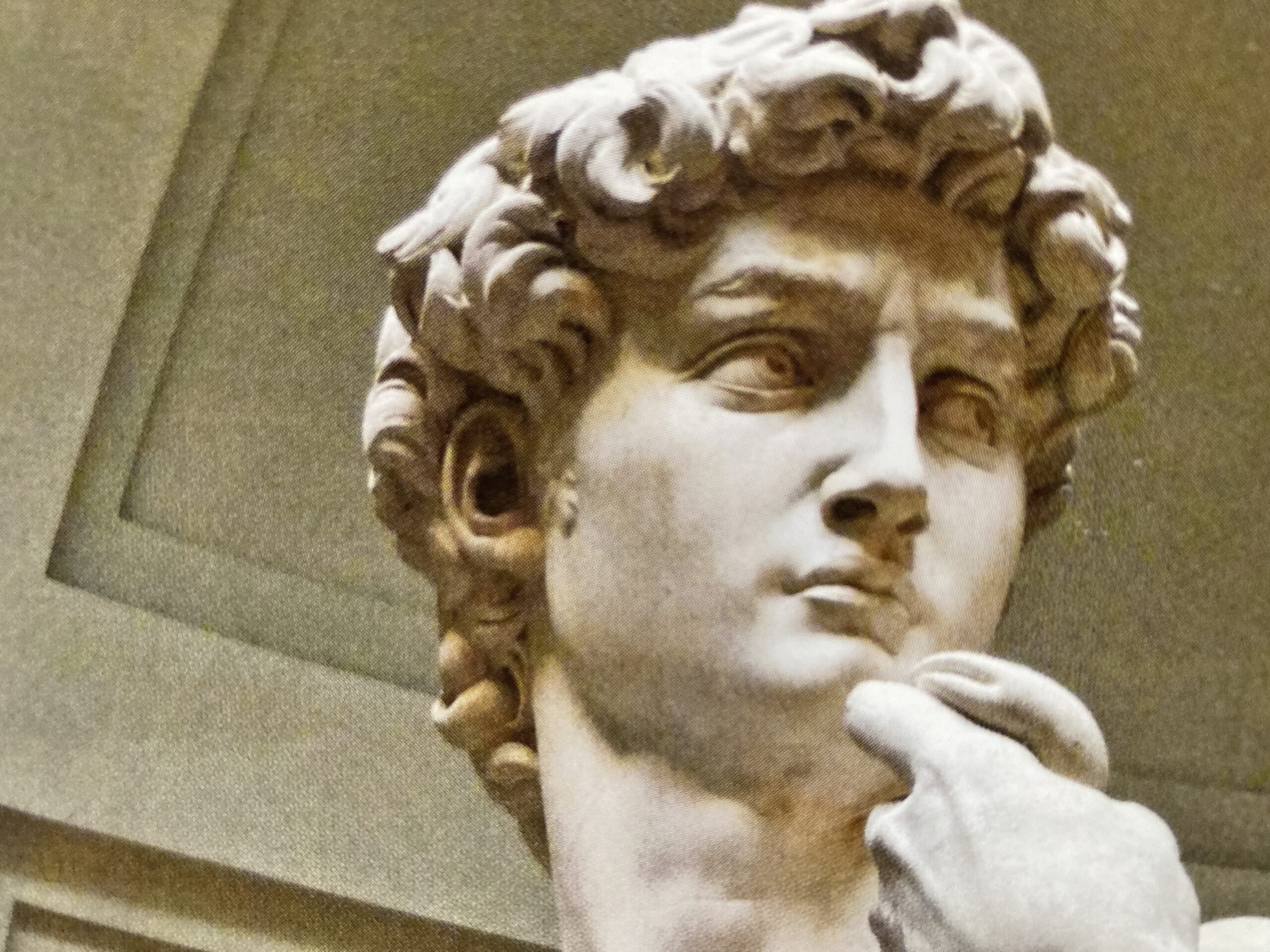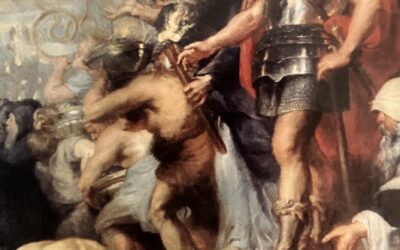I recently read through a discussion on social media about King David. The argument being made was the very notion that the church would hold King David in any kind of esteem proved just how anti-woman and patriarchal the church is. He used his position to get with Bathsheba, which makes him a rapist, they contended. He then tried to cover up her resulting pregnancy by trying to convince her husband to have relations with her and when that didn’t work, King David had her husband murdered. How could the church not only put this despicable man up on a pedestal but rejoice that from him, the savior of the world would eventually come? they questioned.
I did not engage the conversers intent on disparaging King David and our church. I learned many moons ago the fruitlessness of arguing with people on social media. Particularly the people that are not really open to other points of view. But their reducing King David down to nothing more than the sum of his sins really nagged at me.
David was from Bethlehem. He was handsome, strong, courageous. He was a shepherd and a musician. Shepherds had to be tough back then. In order to protect their sheep, they had to fight off wild animals like lions and wolves with little more than a staff, a sling or their bare hands. David was tough and he had a strong faith in God. So, it was really not as surprising as it appeared on the surface when David volunteered to engage Goliath in battle when all the professional soldiers were too afraid to fight the giant Philistine. David had the experience of fighting animals much larger than himself and the assurance that’s God’s hand was with him.
David slew the giant enemy of Israel and became an instant hero.
King Saul, Israel’s leader at the time, was initially pleased with David. David helped win the battle with the Philistines and his harp playing was the only thing that soothed the demon-tormented King Saul. However, King Saul soon grew envious of the star power David had accumulated in Israelite society. His envy became murderous rage and he set out to kill the young man who was once the only person who could bring him peace.
Ancient Near East culture was a brutal time. People did anything and everything to accumulate or keep power. While running for his life, not only did David know he had been chosen by God to replace Saul, he also had several opportunities to kill the enraged monarch. He could have ended the cat and mouse game with one thrust of his sword and taken his rightful place as king. David, however, refused to harm even a hair on the head of Saul. For Saul had been anointed by the Lord and David’s respect for the Lord’s chosen was absolute, even though he, too, had been anointed to take Saul’s place as King of Israel.
God stayed with David during his time on the run. David didn’t always behave perfectly, but each time he’d realized he’d gone askew of God’s wishes, he would re-orient himself to get back on the path of righteousness.
Saul was eventually killed in battle and David, the anointed one, became king. He brought the Ark of the Covenant, the very dwelling place of God, to Jerusalem to put God back in the center of Israel’s existence. Life was good.
As is often times the case for so many of us, affluence brings spiritual laziness and we forget to keep alert for the serpents that are entering the garden of our souls.
One year, instead of going to battle with his men, as was done every spring, King David, at the height of human power, sent his men to battle without him and stayed home. He stood atop the roof of his kingly abode and scanned his kingdom with a wandering eye. The serpent presented to him the forbidden fruit, in the form of a beautiful woman bathing. When he asked about her, he found out she was the wife of one of his loyal soldiers currently in battle, Uriah the Hittite.
At this point, King David had many wives and concubines (very common for men of power in Ancient Near East times, but in no way endorsed by God). He absolutely did not need (to put it in biblical terms) to lie with Bathsheba. But like Adam in the garden of paradise, though he could have any other fruit, he wanted the one that was forbidden.
Bathsheba was brought to David and they had relations. Whether the relations were consensual or not has been debated, since the biblical text doesn’t specify. Arguments can be made for both sides. I’m inclined to think God doesn’t want us to get hung up in those details or he would have given them (as they are given in other parts of the Bible). I think he wants us to focus on the basics. David became spiritually lazy, he gave into temptation and committed mortal sin. The man whom God said was after his own heart had severed their relationship for worldly pleasure. The temporal bad that he had done, no matter how bad, would never be as bad as the spiritual bad he had done.
Like Adam’s sin that sent a ripple throughout all of creation, distorting everything, David’s sin sent a ripple throughout his God-given kingdom and destroyed the peace that had rested there, particularly in his family.
Lying with someone can have consequences. Bathsheba ended up pregnant. David was desperate to cover it up. He brought Uriah the Hittite home from battle and tried to convince him to spend the night with his wife so that it might look like Bathsheba had conceived from that union. Uriah the Hittite refused. He was an honorable man and wouldn’t allow himself the comfort of his own home and wife while his men were at battle. He spent the night camping on the king’s door stoop and then returned to join his comrades.
We commit a sin and then sin to try and cover up the first sin and then sin again to cover up the other sin and so it snowballs out of control. David was determined to cover up his wrong doing. He had tried to clean up his mess nicely, but Uriah the Hittite wouldn’t cooperate. Now he became frantic and ordered Uriah to be moved to an area of battle where death was all but certain. Essentially, he had Uriah killed. With his secret safe and his perceived honor intact, David married Bathsheba and lived in the numbing fog of ‘I’m okay, you’re okay.’ I suspect he told himself that he hadn’t meant for things to go that far, things got out of his control, that it was actually Uriah’s fault for not going along with the plan. When he looked in the mirror, David might have said, ‘basically, I’m a good person.’
The Lord must have thought otherwise because he sent the prophet Nathan to snap David out of his spiritual coma.
Nathan told a parable about a rich man with lots of cattle and a poor man with nothing but one little lamb. One day, the rich man had a friend out to visit and rather than kill something from his large herd, he had the poor man’s lamb killed and served to his visitor.
David was outraged and yelled, “That rich dude deserves to die!”
Nathan yelled, “That rich dude is you!”
God said through Nathan, ‘I made you king and gave you a bunch of wives and gave you a kingdom and if that had been too little, I would have given you more. Instead, you murdered Uriah the Hittite and took his wife as your own. You had him killed by the sword of the Ammonites and for that, the sword shall never leave your house.” Which was Bible talk for ‘there will always be fighting in your family.’ He also told David there would always be fighting in his kingdom.
As the realization comes to many of us when our lives have spiraled completely out of our control on account of bad decision after bad decision, David had his ‘what have I done?’ moment.
He simply said to Nathan, “I have sinned against the Lord.”
And really, could anything else have been said? There is nothing he could have spoken that would have made right what he had done. A terrible consequence of living against how God made us to live is that we do things that we can’t make right. Even if we could give everything to make it right again, some things can’t be undone.
Like Satan, frozen in sin in the pit of Dante’s Inferno, we become frozen in the sin in our lives and endure a complete inability to pull ourselves out of the muck we’ve caused. Thankfully, God does it for us. He did it for David. God saw the contrition in David’s heart and forgave him for what he had done. If only fellow humans could see contrition in each other’s hearts. Perhaps then they might be more charitable when judging a man in his darkest moment.
God forgave David, but David had made a laceration in the temporal reality and it needed to be repaired. God spared David’s life, but he told David the baby born of the adulterous union between he and Bathsheba would die.
The baby became sick. Helpless, David laid on the ground, didn’t eat anything and wept, hoping to persuade God to change his mind. He remained like this for seven days, despite his entourage insisting that he get up and eat something. He, instead, remained until he’d heard news that his baby had died. It was then that David arose, cleaned himself up and then went to the house of the Lord to worship God.
Afterwards, he came back to the castle and asked for something to eat.
“What’s the deal?” his servants asked. “While the baby was alive, you laid around and fasted. Now that it’s dead, you’re up and eating?”
David replied, “While the child was still alive, I fasted and wept; for I said, ‘Who knows whether the Lord will be gracious to me, that the child may live?’ But now he is dead; why should I fast? Can I bring him back again? I shall go to him, but he will not return to me.”
David knew he had done great wrong and he accepted his penance to repair the temporal wound he had made. That I could handle my penance with such peace and decorum!
From thence, forward, David dealt with the repercussions of his fall within the fall. His kids started raping and killing each other. One tried to kill him and take over his kingdom. Israel was at constant war. There were famines. Benjaminites spewed curses at him.
Despite the absolute turmoil his life had become, through it all, David remained faithful and grateful to God. And God never gave up on David.
The church doesn’t hold up David as an example because he was a man and therefore it ignores and downplays his sins. It holds up David because he was a man who sinned egregiously, who had wandered far from God and yet, God still came looking for him. God wanted to restore the relationship he’d once had with David before his mini-fall as he wants to restore the relationship with all of humanity he’d once had with us before the big Fall.
Despite the embarrassing behavior of Israel’s greatest king, the church did not omit it from being recorded, as was often done in the Ancient Near East when writing of their great leaders. The horrible things he did were included in the narrative to illustrate to us what we are all capable of when we stray far from God, no matter our status, our gender, our looks or how great our life is going. The inclusion of this storyline is hardly the trait of a church that is anti-woman or patriarchal. I would argue its inclusion is the opposite.
The story also illustrates how merciful God is to rescue us from ourselves despite our not deserving his mercy in the least.
I started writing this as a defense for King David, but David’s actions are indefensible. He was a man who was given everything, yet still went after what he shouldn’t. However, the story doesn’t end there. He became aware of the evil he had wrought; he was contrite and he repented. And, best of all, God accepted that and forgave him.
The social media discussion’s absolute dismissal of the entirity of a human being because of the bad things he’d done and complete ignoring of any and all repentance reminds me of how grateful I am that it is God that will be judging me and not my fellow humans who can be so devoid of mercy. In that discussion, David was the sum of his worst sins and could never be anything more. To God, we are the sum of His love for us.
We are all indefensible but the story doesn’t end there. The story ends with a cross and a resurrection and a God who doesn’t reduce us down to our sins. He lifts us out of them because He loves us and wants us back in the Garden of Paradise with Him. He wants to restore us despite our sins, not tear us down further because of them. There is no human that has ever lived that would put up with the “toxicity” that God puts up with from each of us. It is not God’s church that is the problem. We are the problem. Once we all realize that we are each the rich dude that deserves to die, can we finally stop pointing fingers at other rich dudes that deserve to die and begin to repair our own relationship with God so that we can one day walk with Him, content in paradise instead of chasing through the muck after forbidden fruit.





0 Comments